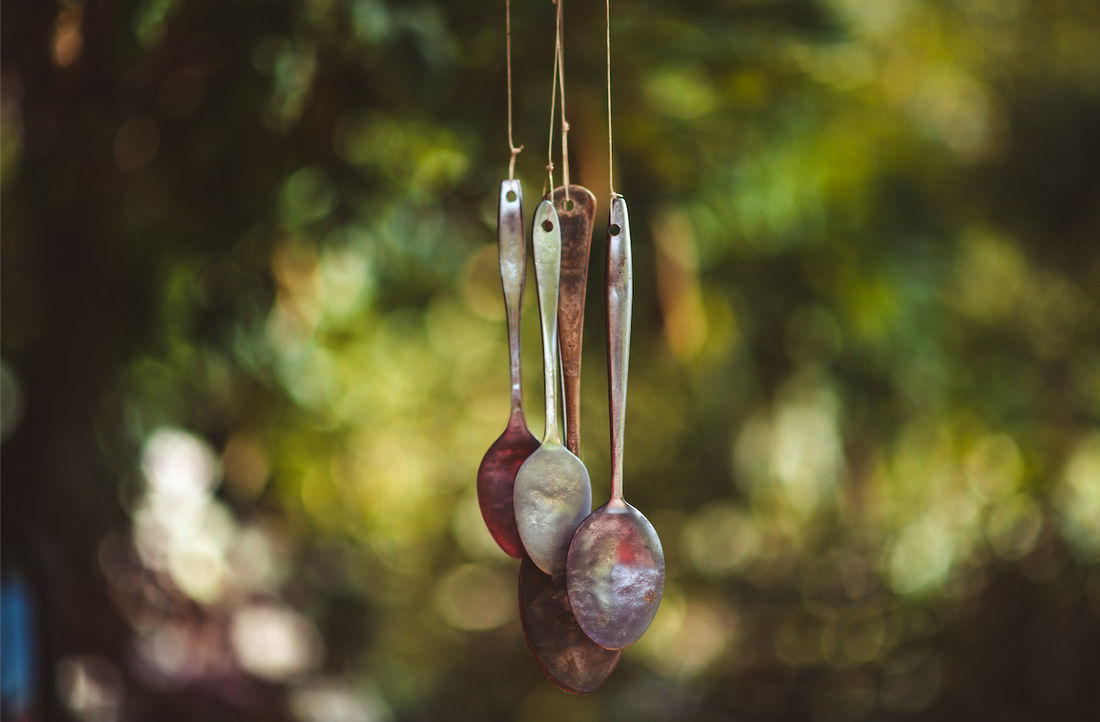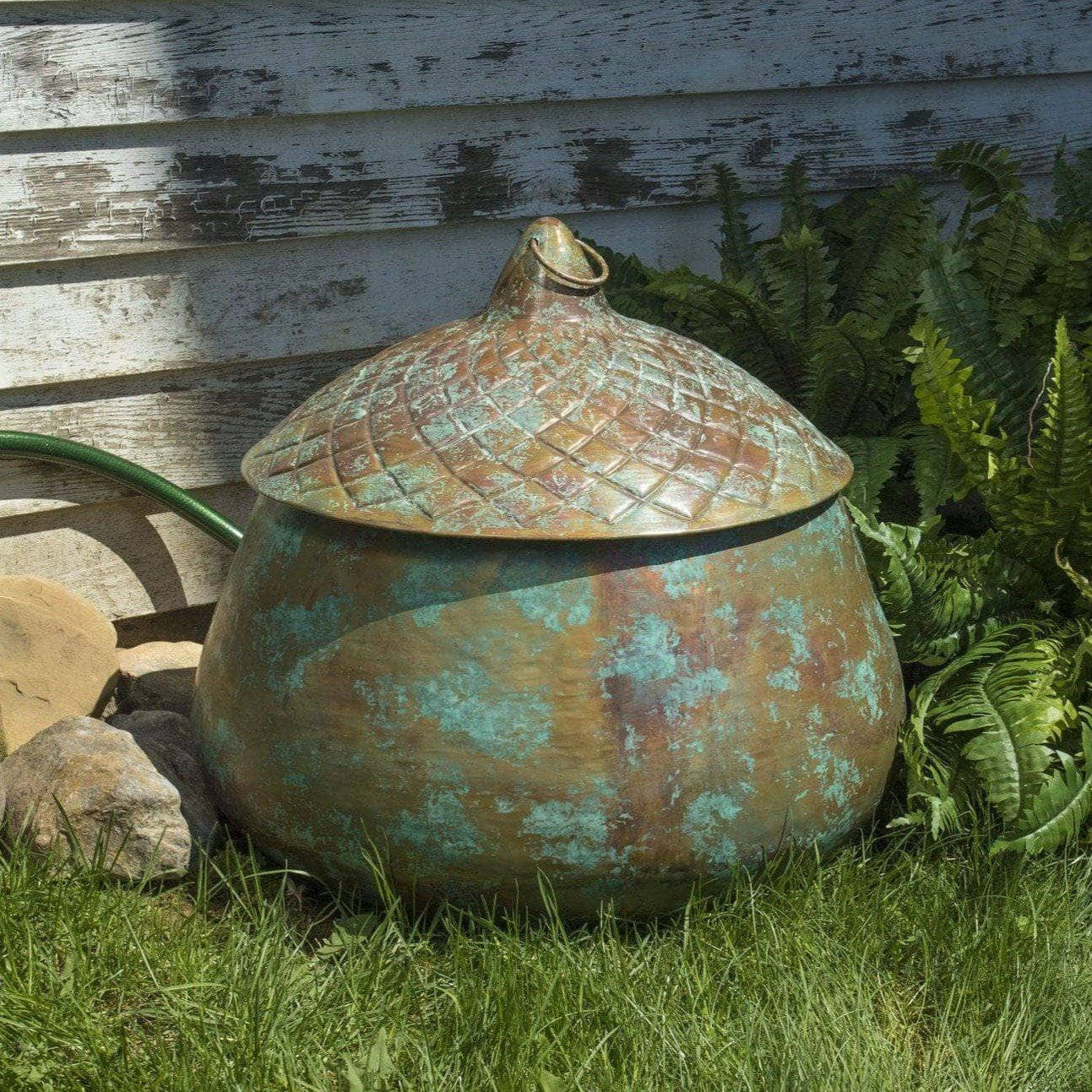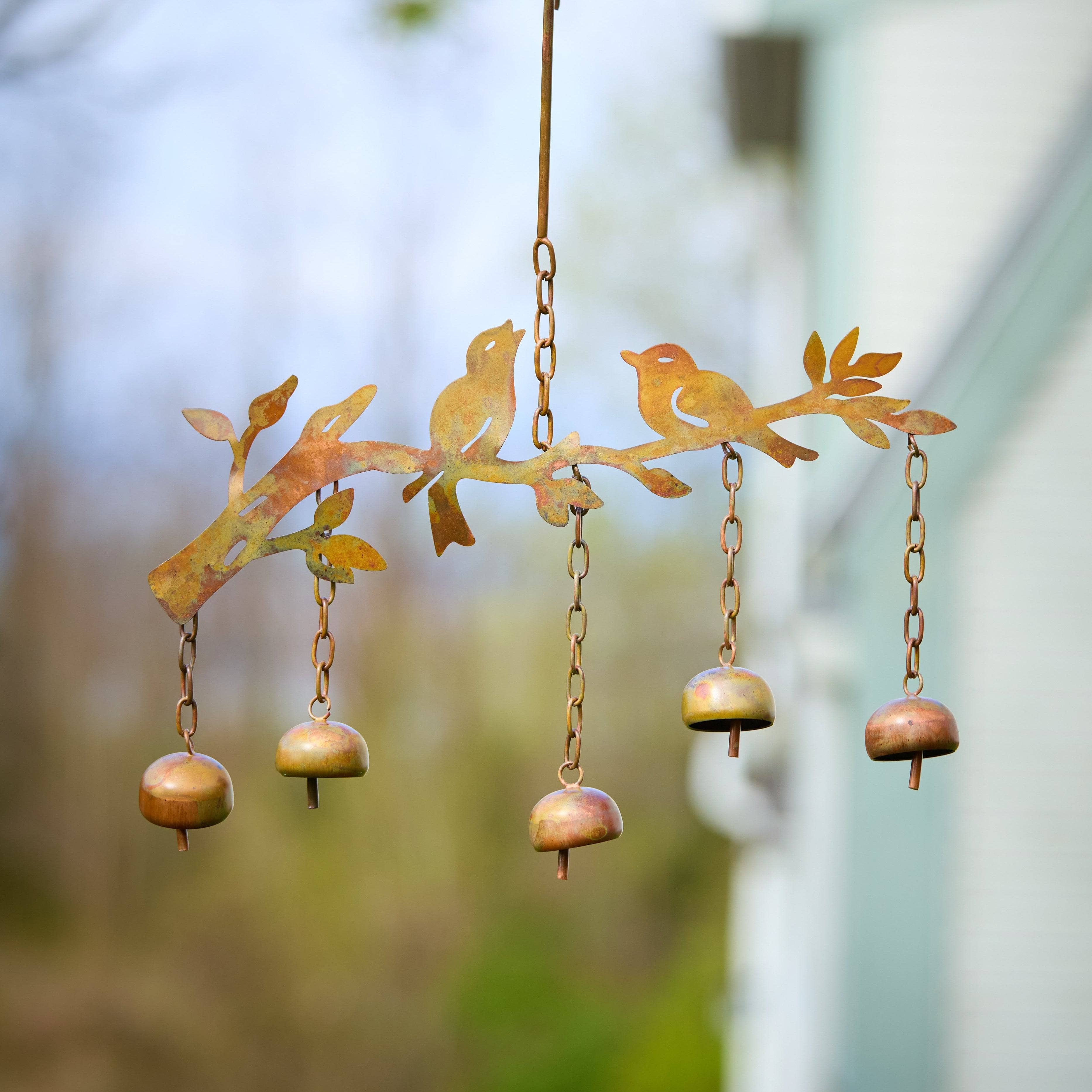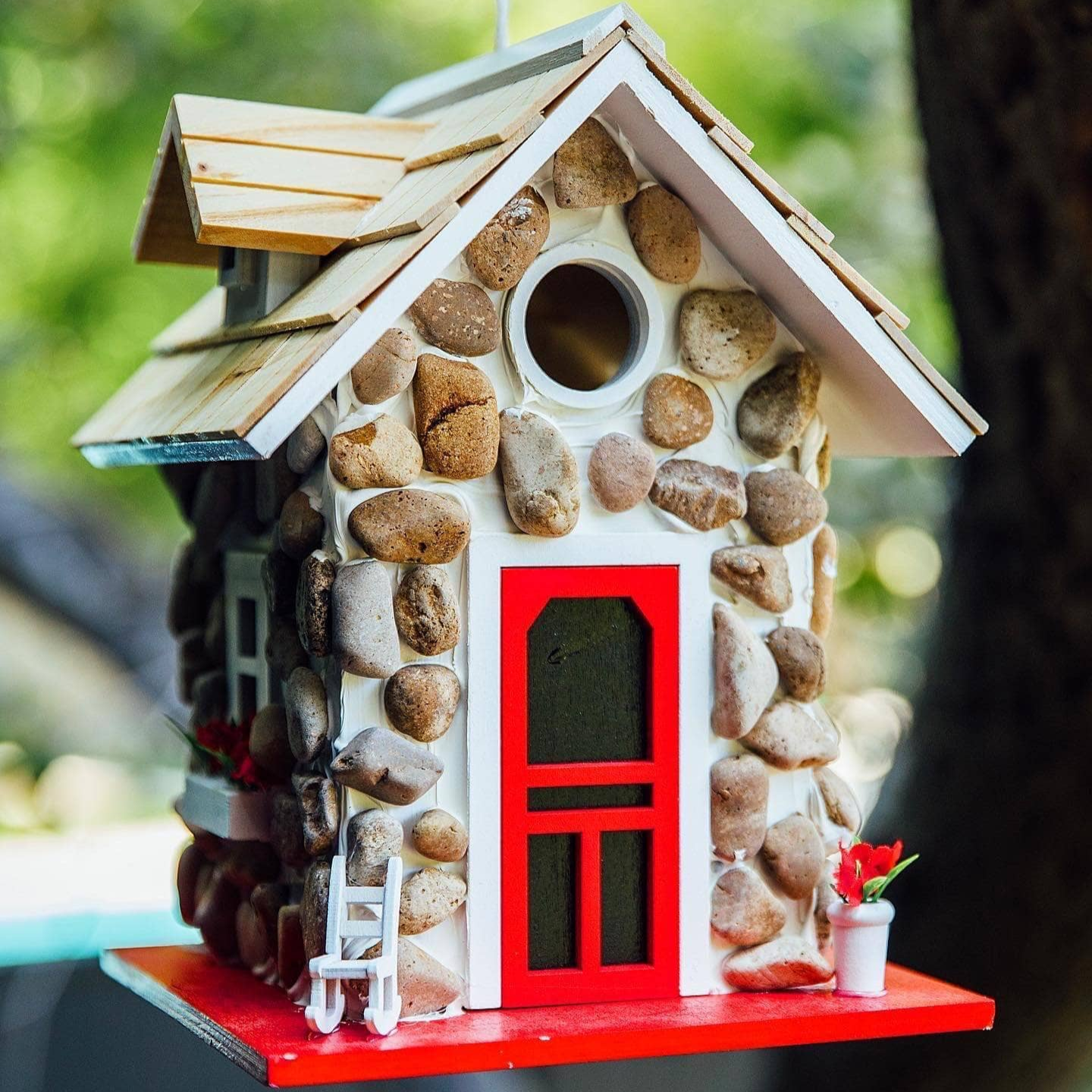
Are Your Wind Chimes Too Loud - How To Muffle Them
Share
Love wind chimes--but growing tired of hearing them night and day? There are plenty of reasons to adore these pieces. And there are also several good reasons to wish they'd pipe down already. (Pun intended!)
Wind chimes are peaceful--and they make gorgeous background music. And here at Happy Gardens, we could listen to wind chimes all night. In fact, some of us have been known to sleep with our windows open, so that when the wind blows outside of our homes, we can hear our chimes whistle and sing.
But some people really want peace and quiet while they sleep. At night, the otherwise-delightful tunes of a windchime can be a nuisance. Whether you live in a windy area, are worried about bothering your neighbors, or are just tired of hearing the sound of those wind chimes while you sleep, there are a few different ways to quiet your wind chimes.
Keep reading to learn how to silence wind chimes--or at least make those wind chimes quieter.
Why Do You Need to Make Wind Chimes Quieter?
Most people hang wind chimes to both be seen and heard. Sure, they're pretty to look at--but the sounds they make are why they're purchased and installed in the first place. They offer a certain peace and tranquility that, for the right ears, is absolutely delightful.
In fact, many people think of wind chimes as the ultimate white noise machine. They even help some people relax--and sleep! And historically, some homeowners have hung wind chimes near a doorway to disturb and drive evil spirits away.
No matter why you've decided to hang your wind chime, it's absolutely your prerogative to try and silence it. Here are some reasons you might decide it's time to reduce the sound of your wind chimes.
The Weather's Quite Windy
When the wind is blowing, your wind chimes will get loud and noisy. And on especially windy days, those sweet sounds could quickly turn annoying. If you're worried about bothering your neighbors with the incessant clanging of your wind chimes, you might want to take down your wind chime, or try some of the ideas offered in this article.
You're Worried About Noise Pollution
Noise pollution happens when sound disturbs the peace. Usually, we think of noise pollution as a big-city problem: honking horns, throngs of people at bars, the revving of engines... But in truth, noise pollution is relative.
Take into account where you live, and what level of noise is appropriate for your community. And remember, if you live in a wide open space, your wind chime likely isn't causing a problem at all.
You Don't Want to Be an Annoying Neighbor
And while you might not mind the sound of a windchime all night long, you'll also need to account for your neighbors. If they live close enough to hear your windchime through their bedroom window, you might need to reconsider how or where you've hung your chime.
After all, you don't want to be the reason someone else can't fall asleep!
You Don't Like the Pitch
If your wind chime actually sounds bad to you, that's a different story. It's possible you don't like the pitch of your windchime. The materials and structure of your wind chime affect the sounds it makes.
Whether your piece uses metal, wood, or bamboo chimes, it's worth investigating whether a different style of wind chime might be "music to your ears."
Want a louder wind chime instead? Check out this how-to guide.
Techniques to Silence Wind Chimes
A wind chime should be relaxing. It should create peace and tranquility. And if that's not happening (for you, or for your annoyed neighbors) it may be time to make a change. Here are some of our favorite, expert tips to help hush a noisy wind chime.
1. Find a More Sheltered Spot
If you've hung your wind chime from a windy spot, then it's bound to create quite a bit of loud noise. Sometimes, the easiest way to muffle a wind chime is to try hanging it in a different place. Search your outdoor space for a place that receives a bit less wind, and see if that helps reduce the sound.
Chances are, this quick fix is all you need to get your wind chimes back to a quieter, more relaxing volume.
2. Wrap the Clapper
If you don't want to relocate your wind chime--or you've found that hanging it somewhere with less of a breeze didn't quiet your wind chime enough--you might want to consider wrapping the clapper.
To do this, you'll need a piece of string or some other material that "freezes" the clapper, preventing it from striking the actual chimes. This will silence wind chimes quite effectively. You can also use a rubber band or something similar.
Do keep in mind that this method isn't the prettiest. If you are looking for a permanent solution to silencing your windchime, you might want to consider purchasing a hanging ornament instead. These pieces of garden decor look like wind chimes, but do not feature the same music-making clappers, bells, and tubes.
3. Try DIY Padding
Another option? Adding cushioning to your wind chime to soften the strike of the clapper against your wind chimes. You can use fabric, bubble wrap, or anything else you find around the house to either pad the wind chime tubes or the clapper itself. Either way, you'll again be "softening" the sound-making strike between the clapper and the chimes.
Do keep in mind that if your wind chime features bells, you'd need to individually pad each of those bells to hush those harmonies.
4. Wool or Cotton Balls
Some wind chime owners have also had success uses cotton balls to stifle the sounds of their wind chimes. If you've got a lot of cotton balls hanging around your house, this method won't silence your wind chime, but it will turn the volume down on the melody. You can also use wool or scraps from a sewing project.
Determine the size of the opening of each of your chimes' pipes to decide whether to use a big cotton ball or regular cotton ball. Then, simply stuff the chimes with the cotton ball or fabric until the material is out of sight.
Our favorite thing about this final trick is that it will successfully reduce the sound of your wind chimes without changing their appearance.
Related: How to Care For Your Wind Chime
Sound Level of a Wind Chime Based on Type
If you're searching for an alternative wind chime or wondering why the one you've selected makes the sounds that it does, this section might be of use to you. Discover how a windchime's style and materials affect a chime's music and volume.
In general, metal wind chimes are tuned to play real notes, are highly durable, and hold up well. Keep in mind that larger wind chimes, and especially larger strikers, can create louder sounds.
Tubular Wind Chime
Tubular wind chimes are very common. Often, they are made from aluminum or another metal, but they are sometimes made from bamboo. Since each tube usually varies in length, each chime produces a different tone, allowing the wind chime to play unique songs.
In that sense, a wind chime works a bit like a xylophone. Think of the clapper as the mallet, and each piece of the xylophone as a tube. When you think of a classic wind chime song, you're almost certainly thinking of the music made by a classic, metal, tubular wind chime.
Types of metal, tubular wind chimes include: aluminum, steel, brass, and copper. Aluminum is the most common, as it's durable and holds up even in tough weather. Steel is a good choice, too: affordable and sustainable. Brass isn't as popular in tubular styles, although it's seen more in gong-style wind chimes, which are discussed later in this article. And finally, copper wind chimes, while more expensive, are quite remarkable, and develop a natural patina over time.
Bamboo Chime
Bamboo wind chimes are another option. Wind chimes made of wood or bamboo are a bit earthier than their metal counterparts. You can expect a more echo-y, hollow sound that's mellow and less high-pitched.
Keep in mind that many of the tips and tricks shared for quieting a wind chime won't be quite as effective on a wood chime, since much of the contact between these pieces is already "softened" or "cushioned" by the wood.
Gong Chime
A gong wind chime, often made of brass, usually has a deeper, stronger sound than other wind chimes. They are a better choice for those who truly want a more resonant, substantial sound.
Bell Chime
A bell chime is a wind chime that features bells. At Happy Gardens, we actually sell wind chimes that feature both bells in addition to a more traditional, tubular wind chime. We also sell wind chimes that only have bells. In that sense, the piece is more like a hanging ornament that features music-making bells. There is not always a clapper.
Selecting a Wind Chime
Shopping for a wind chime of your own? Our Happy Gardens collection features tons of highly-unique, memorable pieces that are sure to make your garden sing. From butterflies to hearts to the sun and the stars, our music-making pieces feature a variety of charming motifs in every shape and size imaginable.
If you're worried about selecting a piece that's too noisy, you can opt for a smaller wind chime, or even consider one of our hanging ornaments. These pieces can jazz up a lonely tree or front porch--without making as much as a squeak.
Frequently Asked Questions
Can you silence a wind chime?
A wind chime is designed to make music. You can silence it by taking it apart, but it's much easier to muffle or quiet the sounds using proven tips and tricks instead. Cotton balls, for example, can be used to pad the insides of tubes to reduce a chime's volume.
Can a neighbor make me take down a wind chime?
While it's unlikely your neighbor will take you to court over a wind chime, you'll probably want to respect their preferences if your chime is creating music within their earshot. That's especially true at night, when there's an expectation of silence.
About Happy Gardens
Happy Gardens is a beloved, one-stop shop for all things garden decor. Whether you're hunting for a new wind chime, a garden statue, or a cute little garden sign, rest assured we have what you're looking for. Feel free to explore our shop, browse what excites you, and pick out something that'll make your outdoor space shine!
Not sure where to begin? No worries. Simply reach out to us via chat or email, and our team can help you pick out the perfect little something for your outdoor space.










